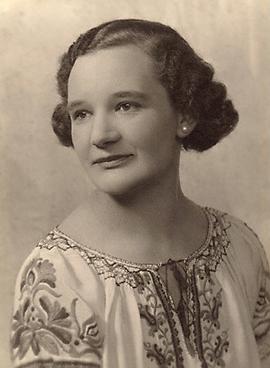Avril Coleridge-Taylor facts for kids
Quick facts for kids
Gwendolen Avril Coleridge-Taylor
|
|
|---|---|

Avril Coleridge-Taylor
|
|
| Born | Gwendolen Avril Coleridge-Taylor 8 March 1903 South Norwood, Surrey |
| Died | 21 December 1998 (aged 95) Seaford, East Sussex |
| Language | English |
| Nationality | British |
| Education | Trinity College of Music |
Gwendolen Avril Coleridge-Taylor (8 March 1903 – 21 December 1998) was an English pianist, conductor, and composer. She was the daughter of composer Samuel Coleridge-Taylor and his wife Jessie (née Walmisley).
Contents
Personal life
She was born in South Norwood, London, the daughter of composer Samuel Coleridge-Taylor and his wife Jessie Walmisley, who had met as students at the Royal College of Music. She had an older brother Hiawatha.
On 19 April 1924 Coleridge-Taylor married Harold Dashwood, in the Croydon parish church. She initially composed and conducted using her first name and maiden surname. After their divorce she dropped her first name, thereafter going as Avril Coleridge-Taylor professionally.
Coleridge-Taylor was invited on a tour of South Africa in 1952, during the period of apartheid, arriving on the inaugural flight of the Comet jet from Croydon to Johannesburg. Originally she was supportive of, or neutral to racial segregation; she was taken as white as she was at least three-quarters white in ancestry. When the government learned that she was one-quarter black (her paternal grandfather was a Creole from Sierra Leone), it would not allow her to work as a composer or conductor.
In 1939, she moved to Buxted in East Sussex where she had views over the South Downs. Coleridge-Taylor died in Seaford on the Sussex coast in late 1998. In 1998 a blue plaque was placed at the nursing home where she spent her last days, Stone's House, Crouch Lane, Seaford.
Career in music
Coleridge-Taylor wrote her first composition, Goodbye Butterfly, at the age of twelve. Later, she won a scholarship for composition and piano at Trinity College of Music in 1915, where she was taught by Gordon Jacob and Alec Rowley.
In 1933 she made her formal debut as a conductor at the Royal Albert Hall. She was the first female conductor of H.M.S. Royal Marines and a frequent guest conductor of the BBC Orchestra and the London Symphony Orchestra. In 1938 she was the first female conductor to conduct at the bandstand in London's Hyde Park. She was the founder and conductor of both the Coleridge-Taylor Symphony Orchestra and its accompanying musical society in 1941, intended to give employment to musicians during the depression. The orchestra at its peak consisted of over 100 musicians made up of seventy professionals and thirty "specially selected" amateur string players, and a choir of seventy voices. She also founded the Malcolm Sargent Symphony Orchestra and the New World Singers.
In 1956 Coleridge-Taylor arranged and conducted the spirituals performed in a BBC radio version of Marc Connelly's (nowadays controversial) play The Green Pastures. In 1957 she wrote her Ceremonial March for Ghana's independence day celebrations, also attended by Martin Luther King.
In later life she wrote a biography of her composer father, The Heritage of Samuel Coleridge-Taylor (London: Dobson, 1979). The book includes her life and memories of her father. She also published compositions under the pseudonym Peter Riley.
Music
Her compositions include large-scale orchestral works, as well as songs, keyboard, and chamber music. They include her first orchestral work To April (1929), which also marked her first appearance as a conductor when it was performed two years later, the suite Spring Magic (1933), Sussex Landscape, op 27 (1936), a Piano Concerto in F minor (1938), From the Hills, In Memoriam R.A.F., and the Golden Wedding Ballet Suite. Wyndore (Windover) and The Elfin Artist, are both for choir and orchestra. Historical Episode (1941), one of her largest works, is a symphonic impression of war-time events and experiences.
There are signs of a revival in interest in her work in the twenty-first century. The manuscript of the Impromptu in A minor, Romance de pan, first performed in 1922, was rediscovered in the Royal College of Music Library collection and performed in Brighton in 2018. Sussex Landscape was played in 2019 by the Chineke! Orchestra at a Queen Elizabeth Hall concert on 22 April 2019, with a repeat at the Royal Festival Hall in October 2020. Wyndore, composed in Alfriston in 1936 and inspired by an Aldous Huxley poem ("I have tuned my music to the trees"), is a seven-minute song without words. The first performance was organised by the Philharmonic Society and took place at Birkenhead on 16 February 1937, conducted by Dr Teasdale Griffiths. The Royal Philharmonic Orchestra gave its first UK performance in 82 years on 7 March 2020 at Boxgrove Priory, Chichester.
Works
Chamber music
- Idylle for flute and piano, Op. 21
- Impromptu for flute and piano, Op. 33
- A Lament for flute and piano, Op. 31
- Fantasie for violin and piano
Keyboard music
- Impromptu, Op. 9
- Rhapsody for piano, Op. 174
- Nocturne for piano solo
- Concert etude
Orchestral music
- Sussex Landscape, (1940) Op. 27
- Wyndore for choir and orchestra (1936)
- Concerto in F minor for piano and orchestra (1938)
- Historical Episode (1941)
- Symphonic Impression (1942)
- Golden Wedding Ballet Suite
- Comet Prelude (1952)
- Ceremonial March to celebrate Ghana's Independence (1957)
Songs
- Goodbye Butterfly, Op. 1
- Mister Sun, Op. 2
- Silver Stars, Op. 3
- Who Knows?, Op. 4
- April, Op. 5
- The Dreaming Water Lily, Op. 6
- The Rustling of Grass, Op. 7 (text: Alfred Noyes)
- The Entranced Hour, Op. 8
- Song, Op. 29
- Nightfall, Op. 43
- Apple Blossom, Op. 44
- Sleeping and Waking, Op. 45
See also
 In Spanish: Avril Coleridge-Taylor para niños
In Spanish: Avril Coleridge-Taylor para niños

